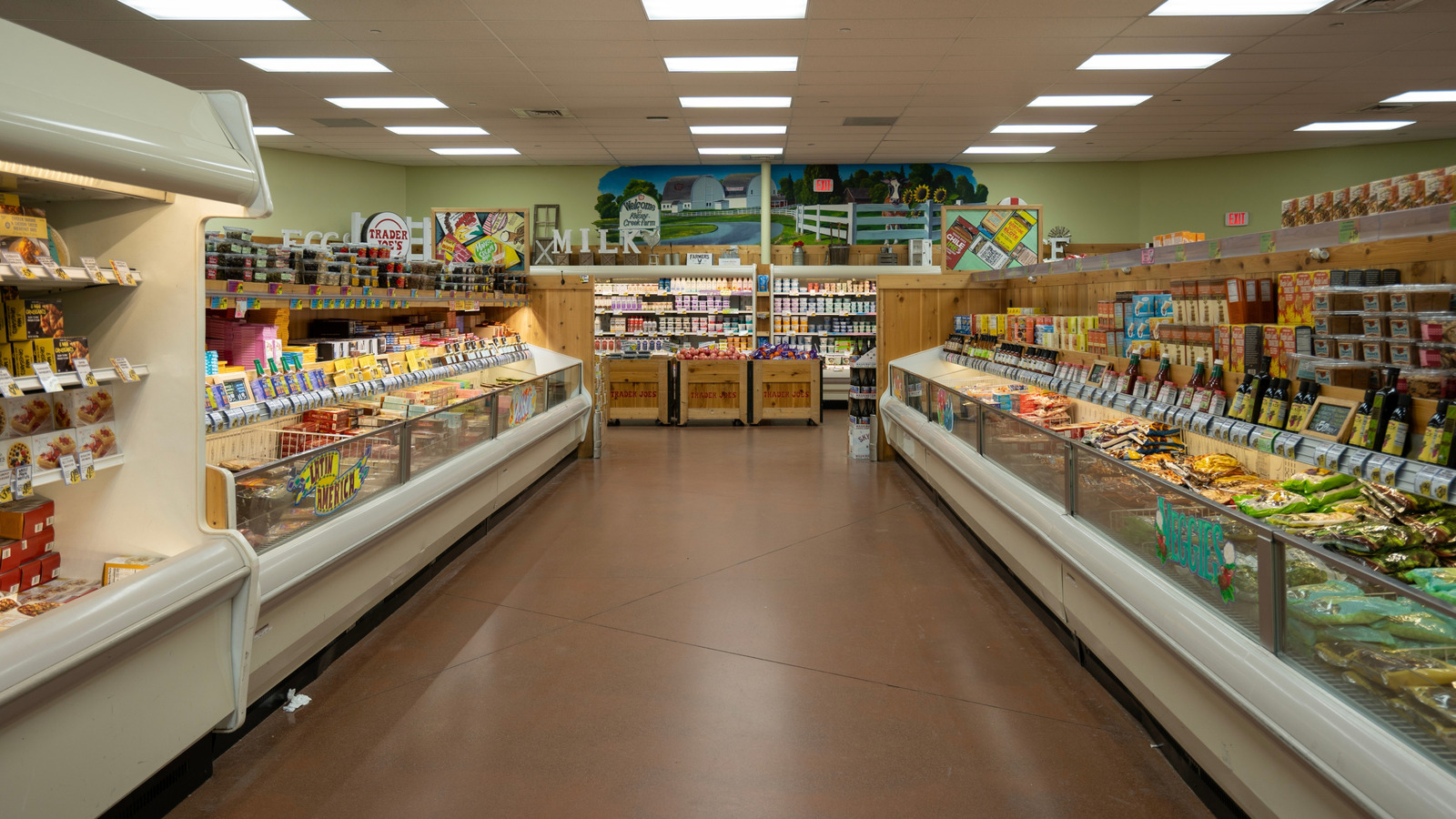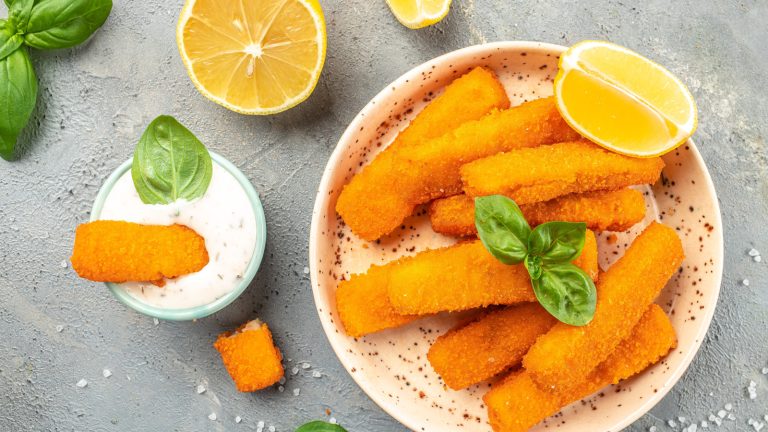It’s always concerning when a food item gets recalled. Not only is it a huge waste of food, but sometimes your favorite products are off the shelves for months — if they ever come back at all. Recalls can affect products at all kinds of grocers, even those more focused on healthy living, like Trader Joe’s.
There are two main reasons that a product is recalled. The first is for contamination of some kind, whether that’s a foreign substance or a pathogen like Salmonella, Listeria, or E. coli. The other reason is usually a problem with the packaging: the label was wrong, an ingredient was left out, or the company failed to identify an allergen. Most of the time, when a product is recalled, it’s not the grocer’s fault, it’s the manufacturer’s.
Sometimes, just a handful of products or one grocer is affected; other times, you’ll find the entire supply chain in shambles. Some of the biggest food recalls in U.S. history involved millions of pounds of food from nearly every grocery chain — including Trader Joe’s, which as has been affected by nearly 150 recalls over the last 25 years.
Spicy Thai style pasta salad in 2010
Cilantro seems to be a “love it or hate it” food. Many people like the fresh and citrusy taste it brings to a dish, while others hate cilantro due to a distinct soapy flavor. Cilantro haters may have felt slightly vindicated in 2010 when Trader Joe’s recalled their spicy Thai style pasta salad and a few other dishes due to the risk of cilantro contamination.
APPA Fine Foods, the distributor of the pasta salad, issued the recall after the Food and Drug Administration (FDA) detected that the cilantro was possibly contaminated with salmonella. The salmonella bacteria are a common cause of food poisoning and can cause diarrhea, fever, and stomach pains.
The spicy Thai style pasta salad was the first Trader Joe’s product pulled in this recall, with 7,325 pounds of the product yanked from store shelves. Not long after, the company also pulled the cilantro dressing, spicy peanut vinaigrette, and cilantro pecan dip. No illnesses were reported in connection with this recall.
Chicken and turkey salads in 2017
The ready-to-eat chicken and turkey salads at Trader Joe’s are usually a healthy option for eating on the go. Typically, they contain poultry plus whatever fruits, veggies, and nuts are included in that particular variety. They are not meant to contain silica and glass, which is what some unfortunate customers found in their salads in 2017.
The manufacturer, Green Cuisine, issued an immediate recall on three Trader Joe’s product — the white meat chicken salad with celery, carrots and green onions, the curried white chicken deli salad with toasted cashews, green onion and a bit of honey, and the turkey cranberry apple salad with sweet dried cranberries, tangy green apples, pecans, and sage. Trader Joe’s was the only grocer affected by this recall, and ultimately 65,621 pounds of product were recalled. No one was hurt, and it is unclear how the foreign materials made it into the salads.
Instant cold brew coffee in 2023
Cold brew coffee is an instant pick-me-up, especially if you live in a hot climate. Another thing that could really wake you up in the mornings? Finding glass in your drink, which is what could have happened to customers drinking Trader Joe’s instant cold brew coffee in 2023.
The product provided an easy, inexpensive way to make cold brew at home — unless, of course, it sent you to the hospital. Luckily, the supplier, Regal Trading, discovered the possible contamination before anyone was injured. The recall was issued in April 2023, and by the end of May, Trader Joe’s stated that all potentially affected products had been removed from its shelves. While there was some concern that products may remain in homes, as the instant cold brew had a long shelf-life, no one ever reported injuries. In all, nearly 75,000 pounds of the ground coffee were pulled from stores.
Chile lime chicken burgers in 2021
Glass, plastic, and silica are all things you don’t want to find in your food or drink. Bones are often another. While you expect to find bones in things like fried chicken or spare ribs, you definitely don’t want to find them in ground meat, like some Trader Joe’s customers did in November of 2021.
The manufacturer, Innovative Solutions, Inc., issued a voluntary recall for Trader Joe’s chile lime chicken burgers as well as the spinach feta chicken sliders after customers reported finding bone in the chicken products. The recall included over a dozen lots of the chile lime chicken burgers and two of the spinach feta chicken sliders.
Although the initial recall was for 97,887 pounds of product, the final amount was 147,153 pounds, according to the Food Safety and Inspection Service (FSIS). Thankfully, while the bits of bone may have grossed some consumers out, no one ended up with injuries. Innovative Solutions, Inc. never revealed how the bones made it through processing.
Almond cookies in 2023
Customers expecting to bite into a delicious, soft almond cookie were unpleasantly surprised in July 2023 when they bit into rocks instead. Two products made by the Fantasy Cookie Corporation, the almond windmill cookies and the dark chocolate chunk and almond cookies, had to be recalled, with roughly 161,221 pounds of product pulled from shelves. No one was injured, and the company never said how the rocks ended up in the cookies.
This would not be the last time a Trader Joe’s product was recalled for rocks. In February 2024, the FSIS had to issue a public health alert for rocks in the Trader Joe’s chicken, lentil, and caramelized onion pilaf with saffron basmati rice, dark chicken meat, dates, and golden raisins. There wasn’t technically a recall, as Trader Joe’s had already stopped selling the product, but customers were warned in case they had purchased the product. The recall was issued after the FSIS had received multiple consumer complaints, with one customer reporting that they sustained a dental injury. The pilaf was manufactured by Mama Vicky’s, Inc., and Trader Joe’s representatives did not say how the rocks made their way into the food at the time.
Unexpected broccoli cheddar soup in 2023
The “unexpected” in the unexpected broccoli cheddar soup is likely meant to refer to the use of Trader Joe’s unexpected cheddar cheese — one of the Trader Joe’s top 17 cheeses. However, consumers in July 2023 found an unexpected and unwelcome surprise upon discovering insects in their soup.
According to the supplier, Winter Gardens Quality Foods, the little bugs had hitched a ride inside the broccoli florets. The Food and Drug Administration (FDA) does have a permissible limit for bugs, because it is “economically impractical to grow, harvest, or process raw products that are totally free of non-hazardous, naturally occurring, unavoidable defects.” However, the amount of bugs in the unexpected broccoli cheddar soup exceeded this limit. This was a level III recall, meaning that while the bugs might be gross, they weren’t dangerous. Nearly 11,000 cases of soup, or 163,335 pounds, were ultimately recalled.
Multigrain crackers with sunflower and flax seeds in 2023
Not long after the unexpected broccoli cheddar soup was recalled, Trader Joe’s was forced to pull another product, this time the multigrain crackers with sunflower and flax seeds. The voluntary recall was issued by the manufacturer, Treehouse Foods, after pieces of metal were found in the crackers. 13,132 cases, or roughly 196,980 pounds, were pulled from shelves. Fortunately, no illnesses were reported.
Only a month later, Trader Joe’s got caught up in another Treehouse Foods recall. This one was much larger, and included Trader Joe’s turkey stock as well as broth, oatmilk, and chai tea latte products from retailers like Aldi, Target, and Whole Foods. The liquids were recalled due to potential microbial contamination. In total, 878,480 pounds of product were recalled across multiple grocery chains. While the Trader Joe’s product was just a small percentage of the recall, it was still a massive recall overall. It’s unclear what led to the potential contamination. TreeHouse Foods has had issues with packaging defects in the past, but the company announced that an ‘internal procedural error’ — not packaging — was responsible for the broth contamination.
Organic tropical fruit blend in 2023 (twice)
Frozen fruit may be the cheat code for flavorful smoothies, but Trader Joe’s frozen organic tropical fruit blend hit headlines In March 2023, when the CDC linked a hepatitis A outbreak to frozen strawberries in products manufactured by Scenic Fruit Company. Hepatitis A is a viral infection that attacks the liver and is most commonly transmitted through contaminated food or water. 325,692 pounds of frozen fruit were recalled from not just Trader Joe’s but companies like Costco and Aldi. At least three people were sickened from this outbreak.
Trader Joe’s was forced to pull the product again in June 2023 after it was determined that pineapple products from SunOpta Inc. were potentially contaminated with Listeria. Listeria, a type of bacteria, is a common cause of foodborne illness. In healthy individuals, it may cause fever, headache, nausea, and diarrhea, but it can be particularly dangerous to those who are immunocompromised, elderly, or pregnant. This recall was not associated with any illnesses, but hundreds of thousands of pounds of frozen fruit were pulled from grocers, including Walmart, Target, and Aldi.
Frozen waffles in 2024
Listeria was a concern again in October 2024 when TreeHouse Foods issued a recall for frozen waffles. At Trader Joe’s, this sent the brand’s blueberry waffles, pumpkin waffles, and gluten-free toaster waffles off the shelves. The recall extended far beyond Trader Joe’s; over 40 different brands were recalled across grocers like Aldi, Target, and Walmart. Some grocers were forced to recall more than half a dozen varieties of frozen waffles and pancakes.
The voluntary recall was issued after TreeHouse Foods found the presence of Listeria during routine testing at one of its facilities. Luckily, as far as was reported, no one got sick from these waffles or pancakes. Frozen breakfast shelves looked a little bare for a while, though, as nearly 10 million cases of waffles had to be yanked from stores in both the U.S. and Canada.
Matcha green tea ice cream in 2017
Metal fragments were the culprit in 2017 when Trader Joe’s matcha green tea ice cream had to be taken off the shelves. Manufacturer Mikawaya pulled the product when it discovered that there may be small metal fragments within the ice cream. It was also forced to pull the red bean ice cream from the brand Shirakiku. Ultimately, 404,568 pounds of ice cream were recalled.
The matcha green tea ice cream had been a favorite of Trader Joe’s fans, so there was marked disappointment when it disappeared from stores. It was also the second Mikawaya recall that Trader Joe’s customers had to endure that summer, the first being a recall of the brand’s chocolate mochi ice cream. This time, however, it wasn’t because of something extra in the ice cream, but something missing on the label – an allergen warning. The ice cream included peanut butter, but the packaging did not indicate the presence of peanuts.
Carnitas with salsa verde burrito in 2018
In October 2018, Trader Joe’s was forced to pull its carnitas with salsa verde burrito from stores after manufacturer Bakkavor Foods USA, Inc. issued a recall for several meat and poultry products. The cause? A double whammy of both Salmonella and Listeria. The culprit was the onions used in the products, and these contaminated onions spawned multiple recalls across dozens of brands and products.
The Bakkavor Foods recall included not just Trader Joe’s burritos, but Harris Teeter burritos and a BBQ-style chicken artisan pizza, as well. This recall resulted in the recall of 795,261 pounds of meat and poultry products. In total, an astonishing 100 million pounds of food were recalled by the beginning of 2019. The contamination traced back to McCain Foods, which processed the onions used in these products. McCain Foods closed the responsible plant just a few months later.
Sliced cantaloupe in 2018 (and 2019)
The contamination risk behind pre-cut fruit and vegetables was laid bare in June 2018 when cantaloupe and other melons were the subject of a 3 million pound recall. The products, packaged in clear clamshell containers, were contaminated with Salmonella. The Centers for Disease Control (CDC) linked 58 illnesses to pre-cut fruits produced by Caito Foods. Trader Joe’s only had to recall its sliced cantaloupe, but companies like Kroger, Walmart, and Whole Foods found themselves pulling multiple products, including fruit salads, fruit trays, and watermelon spears.
Less than a year later, Caito Foods had to issue another melon recall, once again because of Salmonella contamination. Trader Joe’s cantaloupe slices were again absent from shelves, as were a multitude of pre-sliced melon products at Target, Walmart, Kroger, and more. The CDC linked 93 illnesses to this particular strain of Salmonella, though thankfully, no deaths.
Valencia creamy salted peanut butter in 2012
Trader Joe’s Valencia creamy salted peanut butter served as the key to a massive Salmonella outbreak that spanned 20 states. While the first illness was reported in June 2012, the connection to peanut products wasn’t made until September. At that time, experts identified the Valencia creamy salted peanut butter as a common denominator among 78% of patients, and shortly after, this peanut butter, as well as several other nut butters manufactured by Sunland, Inc., were recalled.
The presence of this specific, rare strain of Salmonella was found in the company’s New Mexico facility. While the initial recall had just targeted nut butters and products made with nut butter, like peanut butter candy and cookies, Sunland, Inc., expanded the recall in October 2012 to include peanuts and peanut-containing products processed in the New Mexico plant. Overall, 300 different products were recalled, and 41 cases of food poisoning were linked to this outbreak.
Cotija cheese products in 2024
Trader Joe’s has a stand-out cheese department, but in the case of the 2024 cojita cheese recall, the culprit wasn’t a member of the cheese department, but rather involved products specifically containing cojita cheese. This included nearly a dozen Trader Joe’s items like chicken enchiladas verde, poblano caesar dressing, and the street taco express meal kit.
These items were part of a massive recall of Rizo-Lopez Foods, Inc. dairy products, which were identified as the source of a nationwide Listeria outbreak. In January, the manufacturer had just recalled one cojita cheese product, but upon further investigation by the FDA and CDC, many more were added to the list. By February, Trader Joe’s products, as well as products from brands like Albertsons, Safeway, and Dole, were all recalled. There were numerous hospitalizations and two deaths. In October 2024, the government ordered the company to cease manufacturing.
Frozen vegetables in 2016
In 2016, Listeria was found in frozen vegetables processed by CRF Frozen Foods. The recall began in April, when the company recalled 11 frozen vegetable products sold by companies like Trader Joe’s, Costco, Walmart, and Aldi. At the beginning of May, the company expanded the recall to include all organic and traditional frozen vegetable and fruit products processed in its Pasco, Washington, facility since May 1, 2014. About 456 different products across 42 brands were recalled, a total of over 164 million pounds of food.
While the specific cause of the Listeria contamination was never identified, an FDA inspection at the company’s Pasco facility found that the “materials and workmanship of equipment and utensils does not allow proper cleaning and maintenance.” Seven illnesses and two deaths were tied to this outbreak, leading to the temporary closure of the CRF Frozen Foods facility.





